UK weather: When will it stop raining and the summer improve?
- Published
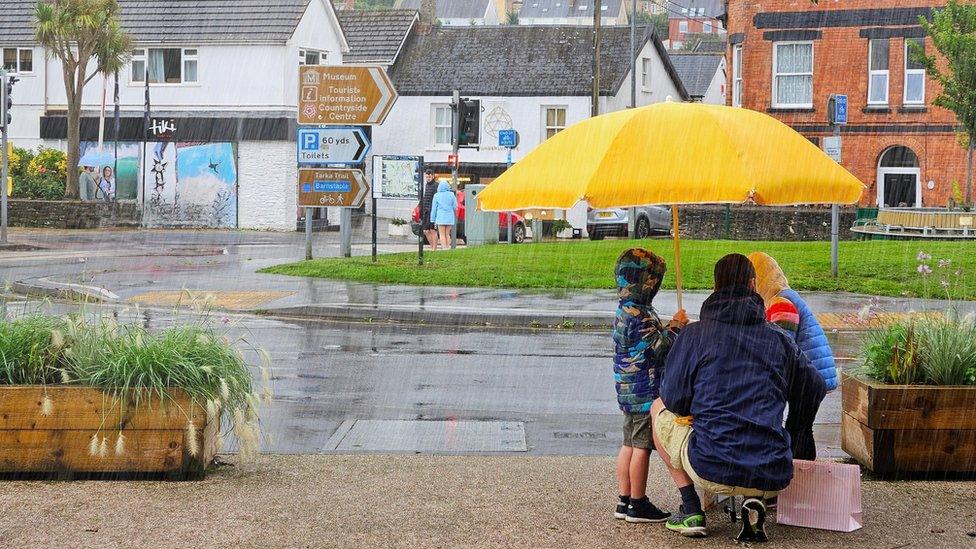
The scene in Braunton, Devon, on Monday, shared by a BBC Weather Watcher
For weeks now, the UK's weather has been unsettled - with widespread rain, cooler temperatures and an autumnal feel.
This is all while much of southern Europe has been enduring dangerous heatwaves that have seen temperatures top 40C and large wildfires.
The two are linked - and crucially it's down to where the jet stream is. So how long will this weather last?
What's the forecast?
"This week and for much of next week it looks as though the unsettled weather will continue for the UK - so there will be further showers or longer spells of rain and at times strong winds," says Gemma Plumb, a BBC Weather forecaster.
Temperatures are set to fall below average for this time of year in many areas and remain between 15C and 20C for the coming week.
"Any drier periods of weather for the UK next week are likely to be short-lived," she adds.
This Wednesday is also set to be particularly windy across southern parts of the UK - with strong winds especially likely along the south coast and through the English Channel.
"It is quite unusual to get these types of storms in August," says Gemma.
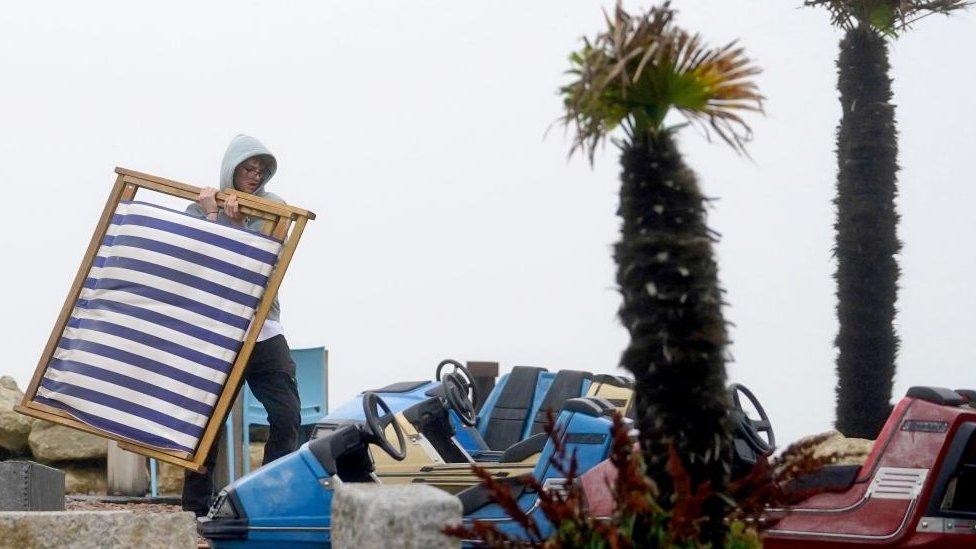
The deckchairs have been packed away, and there are no takers for the rides in Folkestone in this weather
Yasar Dalkilic, owner of the Captain's Table Cafe on Folkestone seafront, says the rain has meant trade has been very quiet, particularly compared to previous years.
"As soon as the schools are closed, we would get really busy, normally," he says. "At the weekends, it's a bit better. But today, it's been dead.
"We're very dependent on tourism and the weather, obviously. It's not looking like it's going to be great for the rest of this year."
What has happened to the jet stream - and why has it made the weather so bad?
Gemma explains that the jet stream - which flows high overhead and brings in high pressure, meaning dry and sunny weather - is normally to the north of UK, but this year is sitting to the south.
"This has brought areas of low pressure and unsettled weather to the UK over the last few weeks and has brought the hot weather to southern Europe," she says.
Tracy Organ, campsite warden at Erwlon Caravan and Camping Park in Llandovery, said some people had been leaving early because of the unusual weather, but that she had actually seen an increase in visitors from the continent.
"I have been speaking to a Belgian couple, and they said a lot of the Europeans are coming here because of the heat out there," she says.
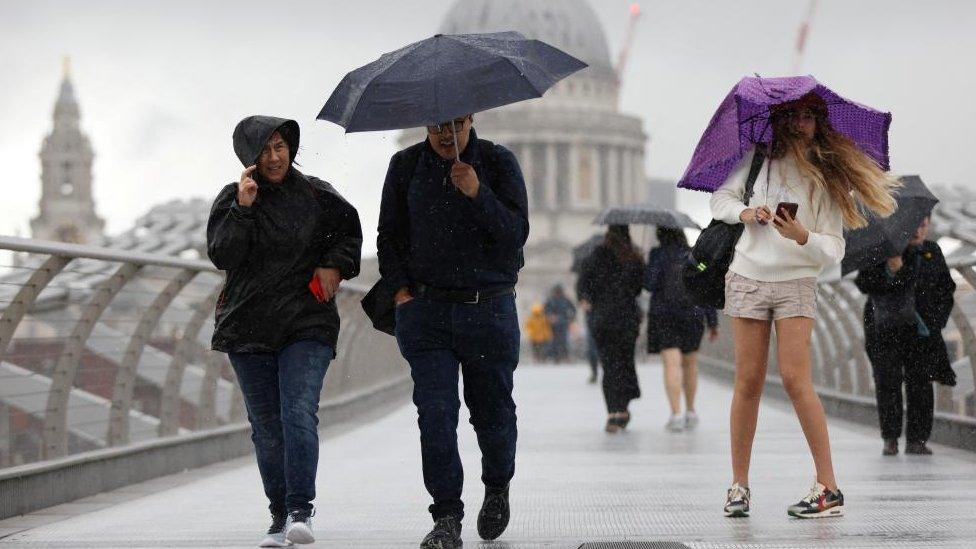
Those crossing London's Millennium Bridge had a tough time of it at the weekend
The record 40C heat seen in the UK last year was also down to the jet stream, which swept hotter air up from the Equator. "We just haven't been in that weather pattern this summer," says the Met Office's Graham Dixon.
Is this year's damp summer linked to climate change? The change in jet position does happen sometimes - but the extreme heat in the south is more than likely why it's out of place this time, says BBC Weather's Paul Goddard. Climate change makes extreme heat worse, scientists say.
"The atmosphere is one big balancing act. Just because it is raining here doesn't mean to say it isn't a product of climate change," says Paul.
When will it stop raining?
It looks as though the unsettled weather will continue through much of August, says Gemma.
"There are signs that more prolonged drier, and slightly warmer, weather is possible later in the month, but more likely into September."
The Met Office also says dry weather is likely to arrive in the UK at the end of August, although it is not expecting the kind of prolonged heat we saw last year.
For now though, July ends as it has been - with more rain. Some places have even seen their wettest Julys on record, such as Castlederg in County Tyrone, NI, and Preston in north-west England. Both stations have seen two to three times the average July rainfall.

People in Belfast saw some incredibly heavy downpours on Monday
Farmers have also warned that a prolonged period of rain could affect the quality of their crops.
Wheat that would have been good enough to be milled into flour to make bread or biscuits, for example, is now only good enough for animal feed, says James Mills, a farmer from outside York. Other crops, like rapeseed, will start to sprout because of the warm and wet weather, again meaning the quality isn't good enough.
And even if you do harvest the crops, the moisture in them is higher than it needs to be - so farmers are having to dry the grain, which is already more expensive because of diesel costs, he says.
"The last year comparable [to this] was 2012, so a decade ago," says James. "Last year, there was the heat. We seem to be having extremes."
Related topics
- Published31 July 2023
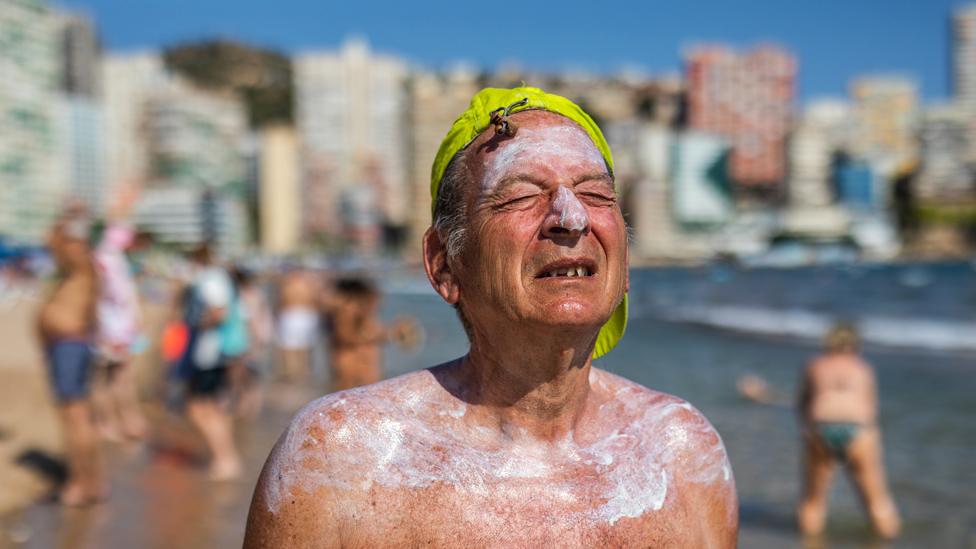
- Attribution
- Published2 August 2023
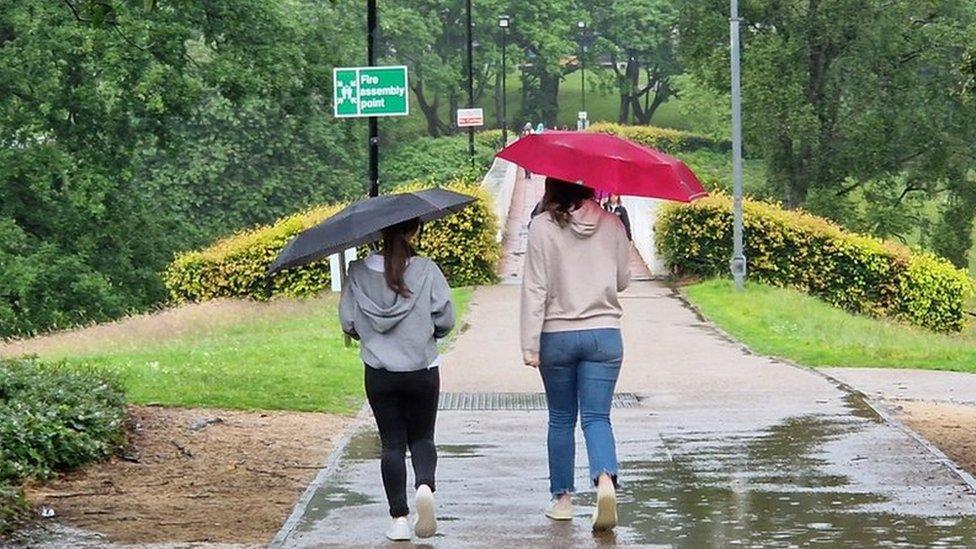
- Published18 July 2022

- Published22 July 2023
